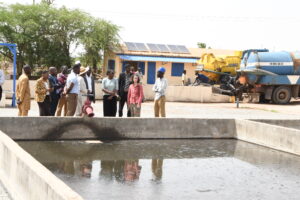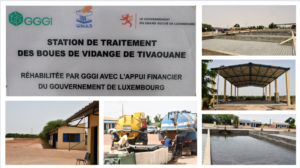On July 13, 2023 – GGGI arranged a high-level visit to Tivaouane in Senegal for the Luxemburg cooperation delegation to inspect the newly rehabilitated and equipped Feacal Sludge Treatment Plant (FSTP). The upgraded FSTP is important because it will improve the city’s sanitation services along the entire value chain and develop the valorization of by-products to create green jobs.
This visit is part of the ‘Green Secondary Cities Wastewater, Solid Wastes, and WEEE Management through Sustainable Business Models for Recycling and Valorization in Senegal’ project, implemented with financial support from the Government of the Grand-Duchy of Luxembourg over four years. The project focuses on sustainable waste management, targeting three types of waste components – plastic, wastewater, and electronic waste – across three cities in Dakar, Tivaouane, and Touba. Click here to learn more about the project.
Photo. N°1 High-level delegation visit of the FSTP site.

Click here to listen to the interviews with the Chief of Luxembourg Cooperation for Senegal and the Faecal Sludge Treatment Plant operator, where they shared their insights on the project’s journey and appreciation of the achievements through this initiative.
The FSTP tackles several issues concerning fecal sludge management in Senegal, such as the inadequate capacity to treat settled fecal sludge and the requirement for a viable business model benefiting 105,000 people.
The project enhances fecal sludge management by increasing the plant’s treatment capacity to 110 m³ of sludge daily and implementing agronomic and energy recovery techniques. It undertook vital infrastructure improvements, including installing advanced pumps for extraction and expanding drying beds. These measures ensure the project meets its goal of improving the plant’s overall efficiency. The treatment process for sewage sludge at the FSTP involves a natural decantation and biological treatment phase aided by the sun. After settling, the sewage sludge moves to drying beds for three weeks, converting it into biochar and organic fertilizer. The remaining effluent is treated in infiltration basins before returning to the water table.
Photo. N°2 Overview of the Rehabilitated Faecal Sludge Treatment Plant.

A solar system that generates 25 kWp was installed in the plant to reduce its carbon footprint. This is expected to result in a reduction of 1.2 tons CO2e over 25 years. The project also created 29 job opportunities. The FSTP will be crucial in promoting green growth in Senegal by improving sanitation and reducing fecal sludge’s environmental and climate impacts.
Using renewable energy generated from the solar system will result in a cleaner environment and a reduced reliance on fossil fuels. Additionally, the plant will contribute to the city’s economic development and create more job opportunities.
GGGI’s next steps involve conducting thorough technical testing on the plant to ensure its equipment for treating and valorizing fecal sludge is reliable. We are confident that we will be able to assess and refine the business model to fully support the pilot’s success and replicate it in other regions. Rehabilitating the Tivaouane Faecal Sludge Treatment plant is vital to achieving sustainable sanitation and responsible waste management for a better tomorrow.
——————————————————-
Local GGGI communications contact
Assana Magagi-Alio, Country Representative, Senegal assana.alio@GGGI.org